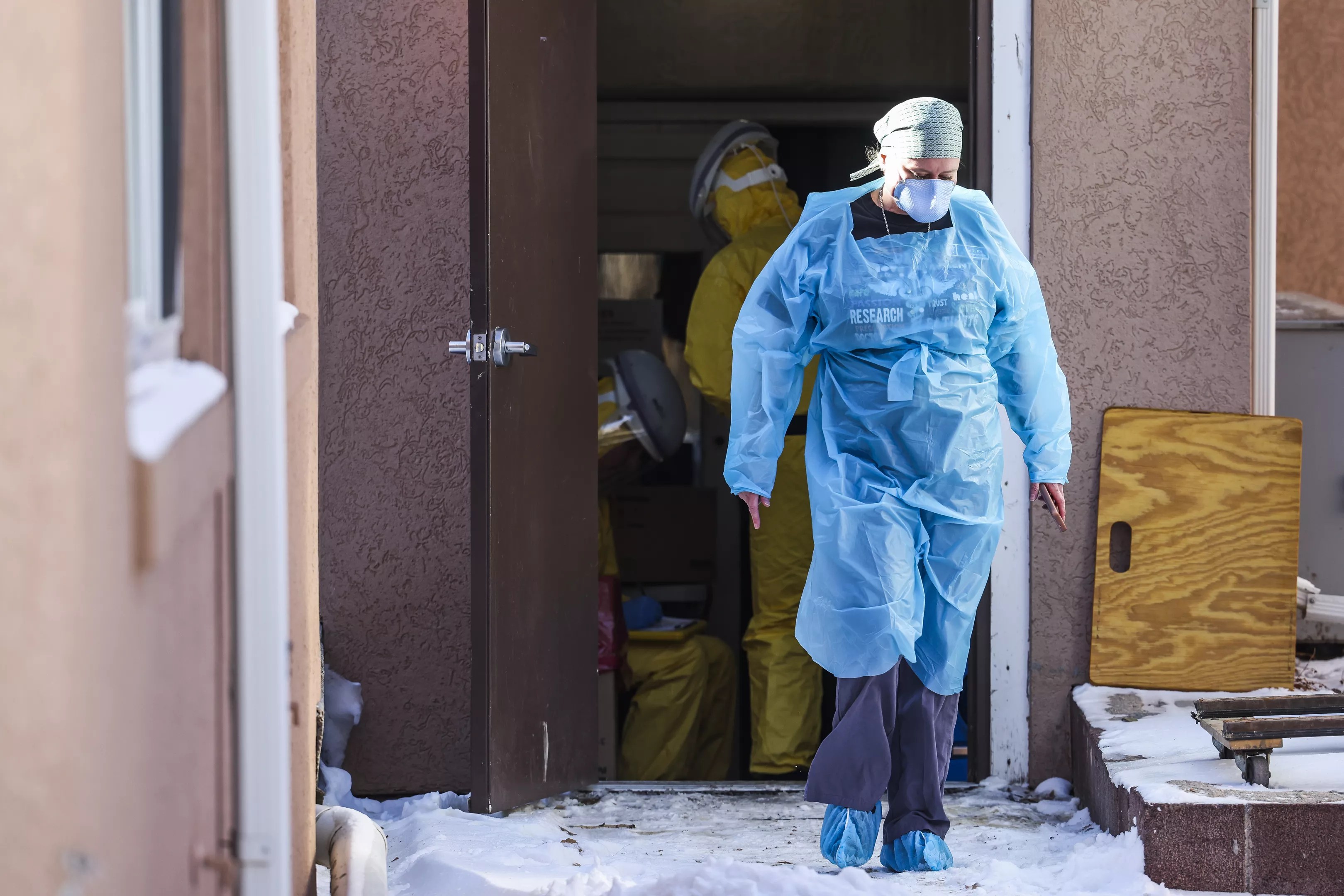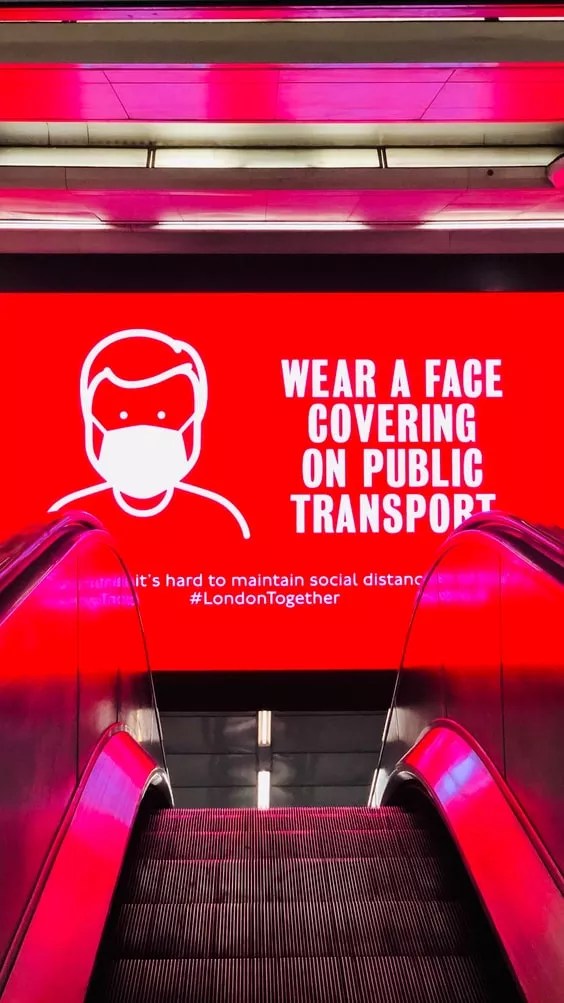
Michael Ciaglo/Getty Images

Audio By Carbonatix
There’s no doubt that Coloradans have had more than enough terrible news in the past year.
But the revelation that a man in Elbert County was the first in the country to test positive for B117 – a new variant of COVID-19 first discovered in Britain – should give everyone cause for concern. The new strain is highly contagious and very persistent. I know that because I’m writing this from London, where it has wreaked havoc in recent weeks.
Like Denver today, the southeast of England seemed to be doing pretty well a few weeks ago. Places were reopening and life was starting to feel kind-of-normal again. But all the while, the new COVID mutation was quietly building and spreading – until, like a giant coronavirus snowball rolling down a hill, it started mowing people down in December. Infection and death rates skyrocketed. Forty-four million people were put on lockdown. Prime Minister Boris Johnson even canceled Christmas. Many Britons were understandably confused and outraged – “How can I tell the kids?” one mother asked reporters – but the government had little choice.

Colorado now seems where Britain was a couple of months ago, because the virus mutation is already working its way through its communities. And B117’s super-contagious nature makes densely populated areas – such as the Mile High City – a perfect breeding ground. As a former Denver resident who still cares about the city and many who live there, I want to warn you that this is a deadly serious business. Over the past week, the B117 variant has already been found in three states – Colorado, California and Florida – and there’s no question it will surge significantly over the coming months.
“The lesson you have to learn about this virus…is that it’s important to get ahead of it in terms of actions,” said Patrick Vallance, the U.K. government’s chief scientific adviser, last week. Unfortunately, the U.K. didn’t get ahead: We were caught napping, and the results have been awful. But hopefully, Colorado can learn from our example and avoid the more deadly consequences we’ve had to face. Here are some key facts that might help you better understand this new threat.
The new ‘mutant’ strain is incredibly contagious
Mutations naturally occur as viruses replicate, and most of those changes have little impact. But this new variant of the SARS-CoV-2 virus features an unusually large number of mutations (23 in total). And early evidence – London was swamped with new cases in just a short matter of weeks – suggests it is very effective at spreading. In fact, a new British study has indicated that B117 is 56 percent more transmissible than other variants.
It is almost certainly well-established in Colorado
Rule 101 with any COVID-19 development: By the time you know about it, it’s already too late. British researchers only recognized the severity of the variant in December, but it was actually present in patient samples as early as September. And so it’s notable that the first Coloradan identified as infected by B117 has no recent travel history. That presumably means he was infected locally, and that B117 has already been quietly spreading throughout local communities for some time. As an epidemiologist remarked this week: “It didn’t teleport across the Atlantic.”
Pressure is likely to increase on Denver’s health services
There’s no evidence that the new variant causes more severe illness, but it doesn’t really need to in order to create havoc. This is, after all, basically a question of numbers. If more people become infected through the highly contagious B117 variant, they will spread the disease to yet more people, resulting in increased admissions to already over-stretched hospitals. In London, such a progression has led to scenes reminiscent of the first COVID wave in April: patient-filled ambulances lined up outside hospitals, rationed oxygen, record daily death tolls and NHS leaders using phrases such as ‘breaking point’ and ‘beyond our control’ on national news programs.
The vaccination process needs to speed up, well, everywhere…
One big worry is that B117’s rapid spread will outpace the capacity of vaccination programs: In other words, people will get sicker faster than they can get vaccinated. Last week, that new British study basically urged countries to up their respective games, noting: “More rapid vaccination is going to be really important for any country that has to deal with [B117] or similar variants.” Both the U.S. and the U.K. are moving more slowly than anticipated – and without a faster vaccination rate, the study warned, the number of COVID hospitalizations and deaths in 2021 might actually exceed those of last year.
Coloradans need to help mitigate the risks
Sadly, there is no silver-bullet solution here. The only real answer to the new threat is to continue demonstrating the kind of strict control measures and safe behaviors that some Americans seem to have struggled with so far. In London, the epicenter of the new outbreak, almost everyone is observing the lockdown rules – the place is a ghost town – and yet the city has still barely dented the infection rate. Obviously, it totally sucks that this dark COVID twist has emerged just as vaccines are finally rolling out, but Coloradans will need to sustain their efforts in order to prevent a fresh surge in cases.
Be mentally prepared for some potentially tough weeks
If B117 takes hold in Colorado the way it has in England, the next few weeks may start to feel a little like the bad old days of last spring. As Johnson told Britons on New Year’s Day: “We have a hard struggle ahead because we face a new variant of the disease that requires a new vigilance.” And yes, there’s a certain cruel irony to finally allowing ourselves to celebrate the vaccine’s arrival, only to be metaphorically slapped in the face with a new COVID super-strain. But remember: Things should start to improve soon. Over here in Britain, the prevailing attitude seems to be that we’re nearly at the finish line – you can almost see the victory tape – so let’s just hunker down and give it one final push until the vaccines kick in.
Finally, some good news: The new vaccines should still work
Most experts agree that the new variant is unlikely to impact the efficacy of the U.S.’s approved Pfizer and Moderna vaccines. Looking way ahead, it’s always possible that some future variant of the virus might pose problems further down the road, but that’s another battle for another day. For the foreseeable future, we have vaccines that work.